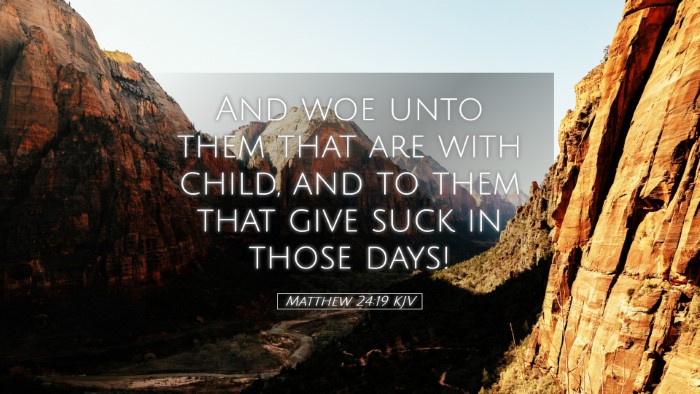Commentary on Matthew 24:19
Matthew 24:19 (KJV): “And woe unto them that are with child, and to them that give suck in those days!”
Contextual Overview
This verse appears within the framework of Jesus’ Olivet Discourse, where He warns His disciples about the impending destruction of Jerusalem and the signs of the end times. Jesus speaks prophetically about the tribulations that will befall the land, particularly emphasizing the suffering of certain groups, including those with children.
Insights from Matthew Henry
Matthew Henry highlights the intense suffering that the populace will experience during the time of calamity. He particularly emphasizes:
- The burden of motherhood: Mothers with children will face unique hardships during these dire times, and their plight is noted as particularly tragic due to the vulnerability of the young.
- The severity of the tribulation: Henry interprets the phrase "woe unto them" as a warning of profound distress, signaling the divine judgment upon Israel.
Insights from Albert Barnes
Albert Barnes provides a detailed exposition on this verse, focusing on the following themes:
- Physical and Emotional Burden: Barnes points out that those who are with child will have a more challenging situation compared to others because they will not only have their own distress but also the responsibility of protecting their offspring.
- Consequences of Judgement: He emphasizes that this passage illustrates the consequences of the suffering that comes as a result of God’s judgment on the nation, urging that those who are unprepared will find themselves in physical and emotional turmoil.
Insights from Adam Clarke
Adam Clarke offers a theological reflection that includes various interpretations and applications of this verse:
- Significance of "woe": Clarke discusses the term "woe" and asserts that it denotes a cry of lamentation, reflecting the emotional depth of the grief that mothers will experience during this period of turmoil and upheaval.
- Symbolism of Motherhood: He remarks on the symbolic nature of motherhood in Scripture, suggesting that the abundance of children is often associated with blessings, but in this context, the very blessings turn into sources of sorrow due to impending calamity.
Theological Implications
From these commentaries, several theological implications emerge:
- Vulnerability in Crisis: The verse highlights the heightened vulnerability of certain groups in the face of crisis, reminding pastoral leaders that the most innocent and defenseless often bear the brunt of societal failures.
- God’s Judgment: The sorrow expressed in this verse serves as a stark reminder of the seriousness of divine judgment and the lengths to which God goes to bring His people to repentance.
- Hope and Redemption: Despite the grim message, the overarching narrative of Matthew’s Gospel reveals a God who ultimately desires reconciliation and healing, urging readers toward hope amid devastation.
Practical Applications for Today
Pastors, students, and theologians can derive several applications from Matthew 24:19:
- Awareness of Suffering: This passage encourages believers to be sensitive to the struggles of others, particularly those who are vulnerable, and to provide support in times of need.
- Preparation and Vigilance: The call to readiness amid turmoil serves as a reminder that spiritual vigilance is essential as believers navigate the complexities of a world filled with uncertainties.
- Advocacy for the Vulnerable: Reflecting upon the message of this verse may inspire church communities to advocate for the marginalized, ensuring that practical and spiritual support is available to those who suffer.
Conclusion
Matthew 24:19 serves as a poignant reminder of the trials that accompany divine judgment and the specific anguish faced by the most vulnerable in society. The insights from Matthew Henry, Albert Barnes, and Adam Clarke offer a multi-faceted understanding of this verse, providing valuable lessons on suffering, vulnerability, and the need for compassion in the life of the Church.


